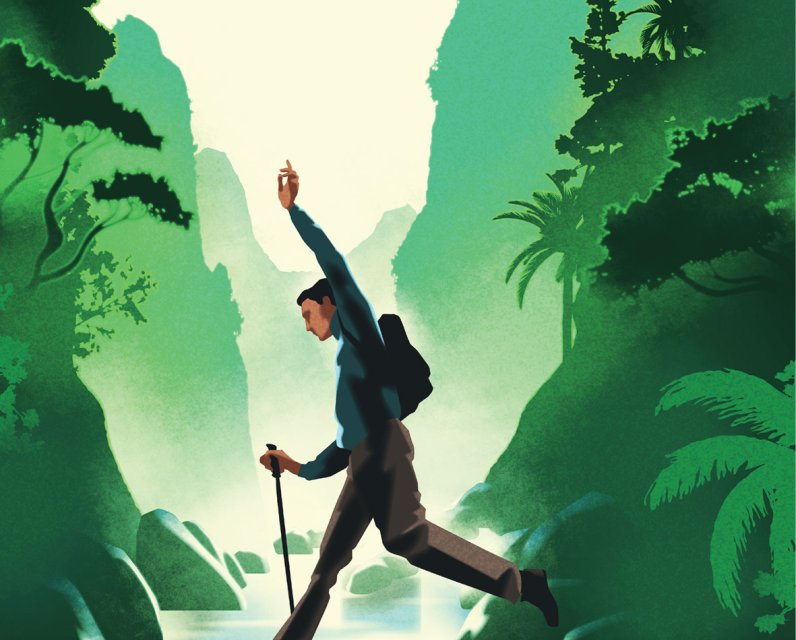Source Feed: Walrus
Author: Guy Nicholson
Publication Date: May 14, 2025 - 14:26
Part 8: Why Do We Travel? For the Challenge
May 14, 2025

console.log("asd");
const foo = document.getElementsByClassName('th-hero-container')[0];
foo.insertAdjacentHTML('afterbegin',`
IN PARTNERSHIP with Toronto Pearson / Canadian Airports Council
`);
.gallery {/*margin-bottom: 0; top: -40px; position: relative;*/}
div.gallery span.hm-tagged {/* margin: 0; */}
@import url('https://fonts.googleapis.com/css2?family=DM+Serif+Text&family=Roboto:ital,wght@0,100;0,300;0,400;0,500;0,700;0,900;1,100;1,300;1,400;1,500;1,700;1,900&display=swap');
.gallery {/*margin-bottom: 0; top: -40px; position: relative;*/}
div.gallery span.hm-tagged {/* margin: 0; */}
Y WE TRAVEL
Why do we travel? For too long, we took this question for granted. Travel can make our large world small, and we forgot what a gift this is until it all got taken away from us not too long ago. Today, we’re returning to the skies in record numbers, but with a more appreciative mindset. It’s a perfect moment to take stock. The contributors to the “Y WE TRAVEL” series are accomplished writers from all walks of life. Over the length of this series, they will explore the diversity of purpose in our journeys—not just where or how, but why. On behalf of Toronto Pearson Airport and the Canadian Airports Council, please enjoy.
Paradise is overrated. We return from our dropdown-menu destinations exactly as we departed: nothing ventured, nothing gained, nothing absorbed. Beach parties, infinity pools, fine dining, luxury hotels: these are the stuff of travel fantasies that I’ve indulged, too. But fantasies lack challenge. Easy getaways may put life’s troubles on the shelf for a few days, but they don’t help us overcome anything.
That’s why I say travel is no time to ignore personal growth. Why not return home at least a little better than when we departed? Growth is meaning, and a challenge is a plot point in life’s grand narrative. Our species has come this far not just because we’ve used our precious time to relax and pamper ourselves, but because we’ve used it to overcome and grow. That shouldn’t stop while we’re in Maui or the Maldives.
After all, those who overcome great travel challenges aren’t remembered as lapsed pamperers; they’re revered as adventurers: Ibn Battuta, Amelia Earhart, Jacques Cousteau, Cheryl Strayed. George Mallory took on Everest just because it was there. How badass is that? Yes, he died trying. But Edmund Hillary and Tenzing Norgay picked up the mantle and in doing so, expanded the limits of human capacity.
The adventurer types aren’t just in it for personal growth, of course. It’s more than that— they’re hard–wired for excitement. “All of my life I’ve been afraid of having nothing to do, having no challenges to meet, being bored,” Hillary told Outside magazine. “The whole of my life has been a battle against boredom.”
Easy getaways may put life’s troubles on the shelf for a few days, but they don’t help us overcome anything. That’s why I say travel is no time to ignore personal growth.
That drive is so strong that as the world runs out of firsts and tops and farthests, adventurers are compelled to invent new ones. My social feeds include friends who have kayaked from Myanmar to Malaysia, cycled from the Pacific to the Atlantic, and completed the Trans-Siberian Railway. Other adventurers I’ve read about have set out to walk every street in New York, cross the planet on a unicycle, or eat at every single Nando’s restaurant outlet.
And how about some props for the travellers who rise to their challenges because of circumstance? They don’t seek out the hard road, but they sure don’t avoid it.
Where We Travel
“I’m a golf traveller. Every fall, my friends and I fly to Florida for a golf and football getaway. But a trip with old pals isn’t just a few days of freedom—you plan and look forward to these trips for months, then relive your best shots and hijinks for years in the group chat. This year will be a little different; I’m turning fifty and we’re rerouting our trip to Ireland, where we’ll be booking rounds at world-famous courses like Ballybunion and Killarney. Ireland is a special place for golfers. It’s a bucolic island where the game is played by the sea, with landmark courses that visitors know by name and reputation years before they finally make the pilgrimage. Here in Canada, Prince Edward Island has some of that same flavour. I see excitement on the faces of golfers from around the world as they fly through Charlottetown Airport (YYG) each summer and fall to play the oceanside Links at Crowbush Cove; pretty Brudenell River; or unique Dundarave, with its forested fairways, red sand bunkers, and commanding river vistas. As we plan our trip, I get a kick from thinking that other groups are planning pilgrimages of their own to courses in my backyard.”
– Doug NewsonCEO, Charlottetown Airport
I think here of the foreign correspondents I worked with in the newspaper business. They found themselves in hard places, ran toward trouble (while others ran from it), and overcame it because they wanted to tell people’s stories. One learned French, Arabic, Mandarin, Russian, and Ukrainian to do the job. Another was kidnapped by militants in Iraq, talked her way to freedom without revealing that she was Israeli, then filed on deadline. A third spent a week sleeping rough in a field in an earthquake zone, dictating stories by satellite phone in the middle of the night. Some of the most gonzo were the photographers: journalism’s rock drummers. One photographer I worked with survived a military helicopter’s crash landing in a Cambodian minefield and spent the night there before making his way back to town. “It was a very bad choice of parking spot,” he said blithely upon return.
I also find myself drawn to great survival stories because there’s nothing more forgettable than a trip where everything goes exactly as planned. These stories can be fact (the Shackleton expedition, the Andes crash) or fiction (Lost in the Barrens, Life of Pi). Check out The Long Walk, a 1956 memoir by former Polish prisoner of war Slavomir Rawicz, later made into a film starring Ed Harris. Rawicz’s tale of an approximately 6,500-kilometre freedom hike from the Siberian Gulag to India was never verified and may have been apocryphal, but I’m not sure I care. It was a meditation on overcoming adversity.
Most of us will never volunteer to be adventurers, foreign correspondents, or survivalists. The risks are too high. Our time is too precious. We’re not quite that bored. We didn’t grow up climbing in the Alps. We don’t have National Geographic funding. But we don’t need to make the record books to grow. We can simply push ourselves to do new things. To step away from the beach towel toward whatever’s happening out there, quite literally, on the street.
We don’t need to learn six languages for a week’s vacation, but surely we can learn six words—hello, please, thanks, yes, no, sorry—and make a point of using them. “Learning how to order breakfast in a country where I don’t speak the language and haven’t been before—that’s really satisfying to me,” Anthony Bourdain said.
And we don’t need to trek thousands of kilometres through foreign lands, but surely we can step outside the resort gates to experience life. To follow our noses, not our itineraries. To skip the shuttle bus and the tour guides and meet people where they live. To make a few decisions on the fly.
That last piece, spontaneity, is getting less common as digital technology transforms travel. Not that long ago, we’d pull into a train station, change some cash, and go looking for a hotel. It forced us to walk the streets, ask for directions, and get a feel for the place. Today, we can scan thousands of reviews, book an Airbnb, and cash in the points before we even leave the couch. Interfaces and algorithms have made our wanderings more efficient, but have they made them better? Because there’s nothing more efficient than going nowhere. The decision to head out into the world needs to be about something more.
When we travel, let’s embrace the obstacles we face instead of just indulging our fantasies. Let’s challenge ourselves—even if it’s just a little.
Guy Nicholson is director of editorial at Toronto Pearson and a former journalist. He was managing editor at the Cambodia Daily in Phnom Penh and deputy foreign editor at the Globe and Mail in Toronto, and is publisher of Catalogue 18 magazine.
Explore the rest of the Y WE TRAVEL series.
Part 1: We travel to meet the neighbours
Part 2: We travel to experience awe
Part 3: We travel to relive our past lives
Part 4: We travel to make family memories
Part 5: We travel to taste the unknown
Part 6: We travel because nature is everywhere
Part 7: We travel to drink in the beauty
The post Part 8: Why Do We Travel? For the Challenge first appeared on The Walrus.
Legault says he wants to see new projects launched across Quebec in the face of U.S. President Donald Trump’s economic threats, including in the mining sector.
June 6, 2025 - 14:54 | Globalnews Digital | Global News - Canada
The Ottawa Redblacks wasted absolutely no time in carrying over one of their worst habits from last year into their 2025 CFL season opener. Read More
June 6, 2025 - 14:51 | Don Brennan | Ottawa Citizen
A new study reveals what drinking tea and eating dark chocolate and berries did for a group of more than 120,000 people.
Those foods, as well as fruits like grapes, apples, oranges, and beverages like red wine, all contain flavonoids, which are compounds found in many plant products. Flavonoids can “help your body function more efficiently while protecting it against everyday toxins and stressors,”
per Healthline
. The study’s authors said those who...
June 6, 2025 - 14:44 | National Post Staff | National Post




Comments
Be the first to comment